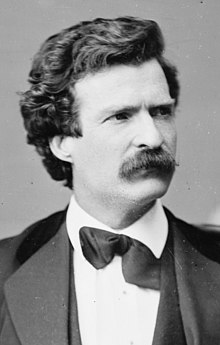Samuel L. Clemens
| Mark Twain | |
|---|---|

Twain in February 1871
(photo by Mathew Brady) |
|
| Born | Samuel Langhorne Clemens November 30, 1835 Florida, Missouri, U.S. |
| Died | April 21, 1910 (aged 74) Redding, Connecticut, U.S. |
| Resting place |
Woodlawn Cemetery, Elmira, New York, U.S. |
| Pen name | Mark Twain |
| Occupation | Writer, humorist, entrepreneur, publisher, lecturer |
| Notable works |
Adventures of Huckleberry Finn The Adventures of Tom Sawyer |
| Spouse | Olivia Langdon Clemens (m. 1870; her death 1904) |
| Children | 4 (including Susy, Clara, and Jean) |
| Relatives |
John Marshall Clemens (father) Orion Clemens (brother) |
|
|
|
| Signature |  |
Samuel Langhorne Clemens (November 30, 1835 – April 21, 1910), better known by his pen name Mark Twain, was an American writer, humorist, entrepreneur, publisher, and lecturer. Among his novels are The Adventures of Tom Sawyer (1876) and its sequel, Adventures of Huckleberry Finn (1885), the latter often called "The Great American Novel".
Twain was raised in Hannibal, Missouri, which later provided the setting for Tom Sawyer and Huckleberry Finn. After an apprenticeship with a printer, Twain worked as a typesetter and contributed articles to the newspaper of his older brother, Orion Clemens. He later became a riverboat pilot on the Mississippi River before heading west to join Orion in Nevada. He referred humorously to his lack of success at mining, turning to journalism for the Virginia City Territorial Enterprise. In 1865, his humorous story "The Celebrated Jumping Frog of Calaveras County" was published, based on a story he heard at Angels Hotel in Angels Camp, California, where he had spent some time as a miner. The short story brought international attention and was even translated into classic Greek. His wit and satire, in prose and in speech, earned praise from critics and peers, and he was a friend to presidents, artists, industrialists, and European royalty.
Although Twain earned a great deal of money from his writings and lectures, he invested in ventures that lost a great deal of money, notably the Paige Compositor, a mechanical typesetter, which failed because of its complexity and imprecision. In the wake of these financial setbacks, he filed for protection from his creditors via bankruptcy, and with the help of Henry Huttleston Rogers eventually overcame his financial troubles. Twain chose to pay all his pre-bankruptcy creditors in full, even though he had no legal responsibility to do so.
...
Wikipedia
